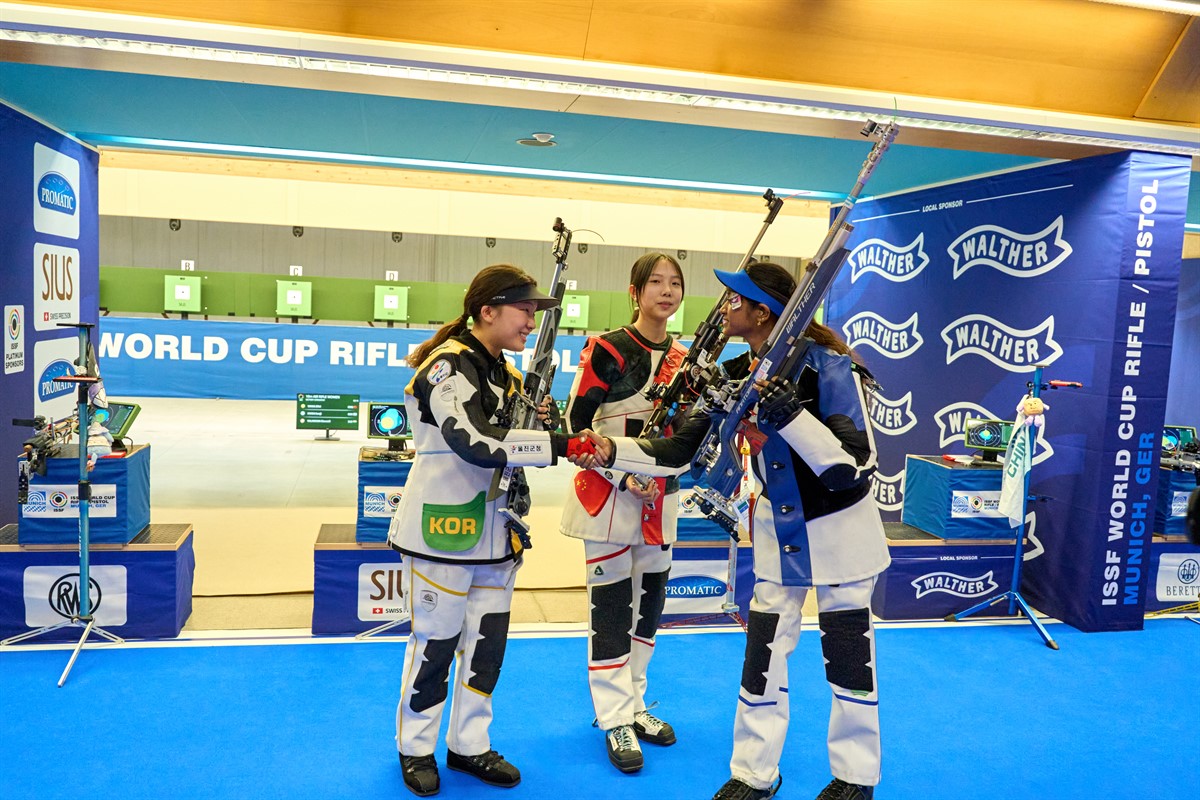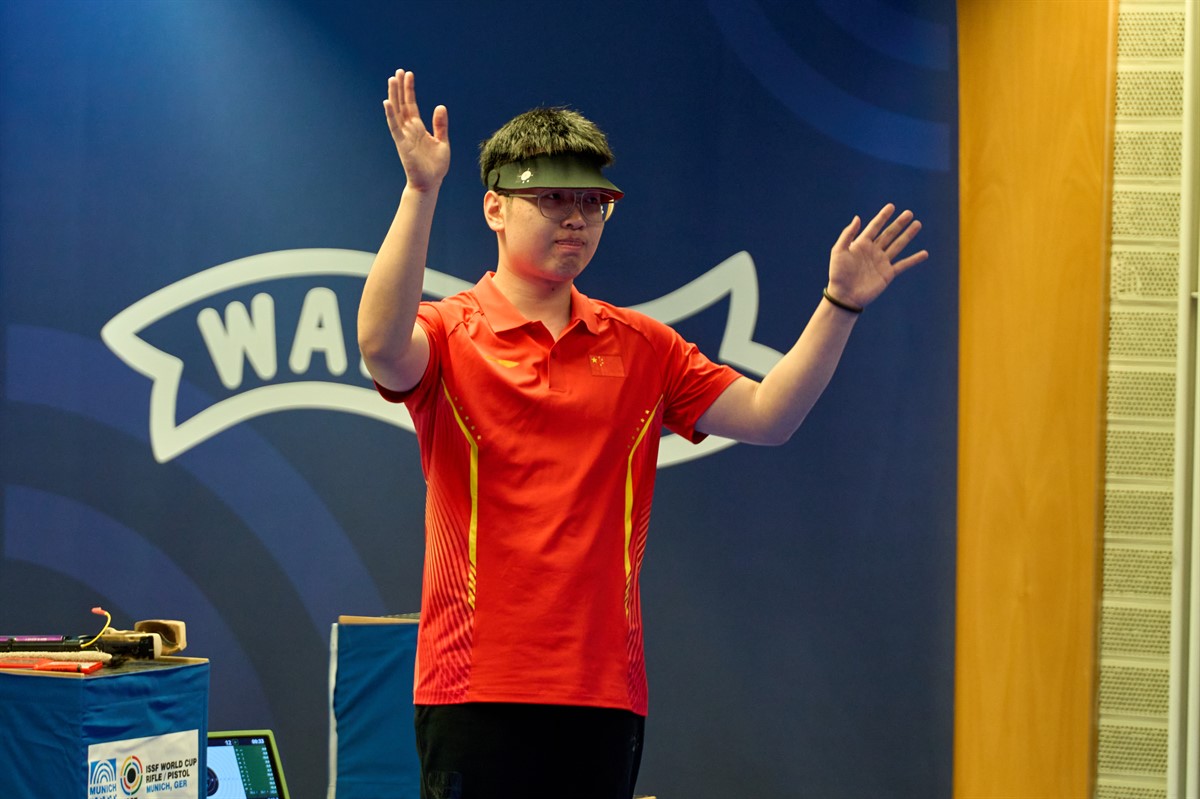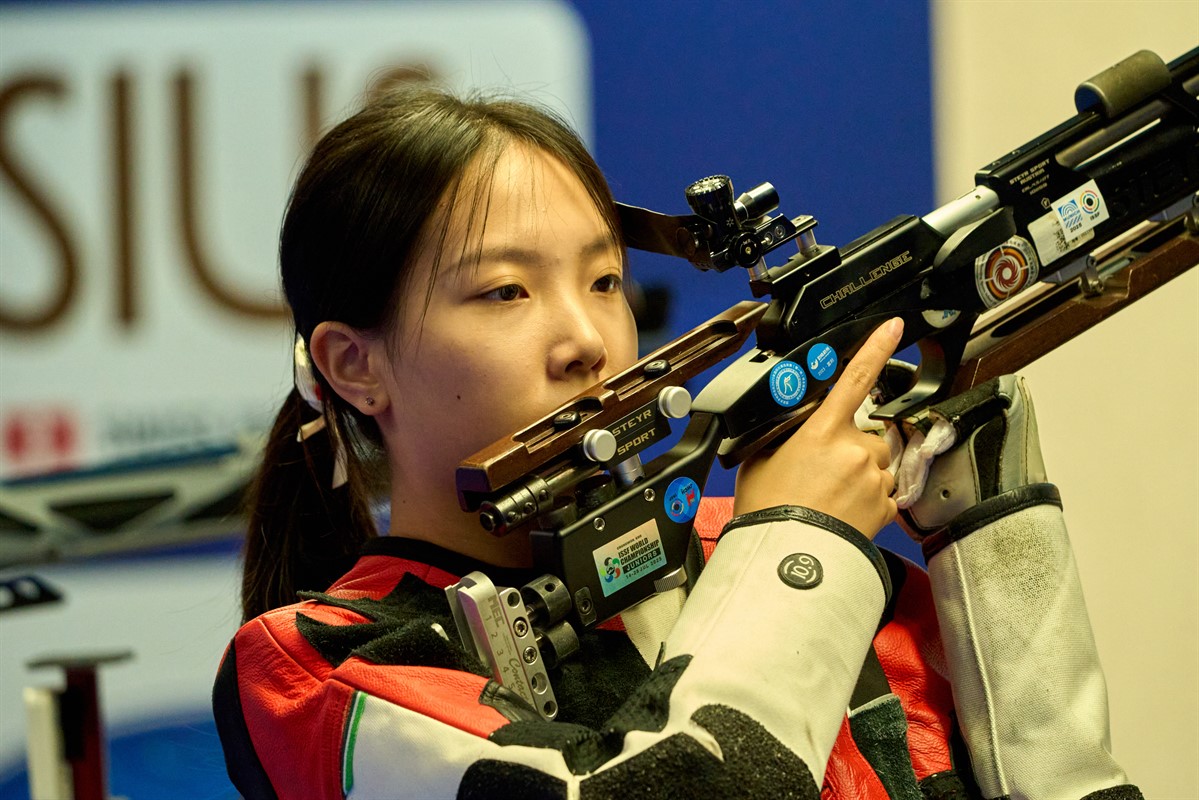Despite the proverbial target on her back, Wang Zifei once again vanquished all challengers in the women's 10m air rifle final, to make it three ISSF World Cup wins from three this season - this time in Munich, Germany.
The Chinese athlete has quickly established herself as the hot favourite in the event heading into the ISSF World Championships later this year, but faced her hardest opposition on this occasion, ran close by Kwon Eun-ji of the Republic of Korea and Elavenil Valarivan from India.
Later, Hu Kai staged an important comeback with the last shot of the men's 10m air pistol competition to match his teammate's feat, ensuring he remains undefeated on the World Cup circuit in this event this season too. Close battles with Kazakhstan's Valeriy Rakhimzhan and Christian Reitz of Germany would end in another Chinese gold.
The Chinese athlete has quickly established herself as the hot favourite in the event heading into the ISSF World Championships later this year, but faced her hardest opposition on this occasion, ran close by Kwon Eun-ji of the Republic of Korea and Elavenil Valarivan from India.
Later, Hu Kai staged an important comeback with the last shot of the men's 10m air pistol competition to match his teammate's feat, ensuring he remains undefeated on the World Cup circuit in this event this season too. Close battles with Kazakhstan's Valeriy Rakhimzhan and Christian Reitz of Germany would end in another Chinese gold.
 An incredible women's 10m air rifle final saw several challengers for the gold
An incredible women's 10m air rifle final saw several challengers for the goldWomen's 10m air rifle final
Recently turned 18, Wang has truly came of age and despite her inexperience compared to her fellow finalists, you would be a fool to think she is not an athlete capable of matching decorated stars. It was clear to continue her streak, Wang would need to remain consistent - as she finished the first competition stage on 105.9 alongside Kwon, while Valarivan and Jeanette Hegg Duestad of Norway sat on 105.8.
Those scores reflected the incredible depth amongst the top eight. Turkey's Elif Berfin Altun would be the first eliminated, followed by the Olympic champion Ban Hyo-jin of the Republic of Korea, who narrowly missed out in a battle with China's Han Jiayu. Han would be next to leave as the top four had become a top five, with Oceanne Muller from France joining the race for first.
Muller was excellent in the second stage and despite making up the ground to go to a shoot-off with Duestad, she would miss out, finishing fifth. Prior to this round, just 0.3 points separated the five, but now Valarivan had a lead of 0.3 over Wang, with Kwon and Duestad further back. While the Chinese cut the gap to 0.2, the Indian maintained her lead after the next two shots by 0.2, while Kwon moved to 0.5 behind the leader after holding off the Norwegian for a guaranteed medal.
However, the drama would not end there - a 9.8 shot endangered Valarivan's chance of a gold, gifting Kwon the lead ahead of Wang. A 10.9 from Wang would give her the lead and with Kwon scoring solidly on her second shot, she remained in the top two - meaning Valarivan would be eliminated by 0.2. Wang's maximum score gave her a 0.4 lead and she was able to hold on despite an impressive 10.8 from Kwon on her last shot. It meant Wang finished with 252.7 to Kwon's 252.6. An incredible final to remember.
It was an incredible start to the week for the teenager, who now holds all four individual women's 10m air rifle records over senior and junior categories. While her total today could not match her world record of 254.8, she bettered the junior qualification world record and now obtained the qualification world record after topping the standings with a total of 637.9. The previous mark was set by Germany's Anna Janssen at last year's ISSF World Cup Final in New Delhi, which was 636.9.
Recently turned 18, Wang has truly came of age and despite her inexperience compared to her fellow finalists, you would be a fool to think she is not an athlete capable of matching decorated stars. It was clear to continue her streak, Wang would need to remain consistent - as she finished the first competition stage on 105.9 alongside Kwon, while Valarivan and Jeanette Hegg Duestad of Norway sat on 105.8.
Those scores reflected the incredible depth amongst the top eight. Turkey's Elif Berfin Altun would be the first eliminated, followed by the Olympic champion Ban Hyo-jin of the Republic of Korea, who narrowly missed out in a battle with China's Han Jiayu. Han would be next to leave as the top four had become a top five, with Oceanne Muller from France joining the race for first.
Muller was excellent in the second stage and despite making up the ground to go to a shoot-off with Duestad, she would miss out, finishing fifth. Prior to this round, just 0.3 points separated the five, but now Valarivan had a lead of 0.3 over Wang, with Kwon and Duestad further back. While the Chinese cut the gap to 0.2, the Indian maintained her lead after the next two shots by 0.2, while Kwon moved to 0.5 behind the leader after holding off the Norwegian for a guaranteed medal.
However, the drama would not end there - a 9.8 shot endangered Valarivan's chance of a gold, gifting Kwon the lead ahead of Wang. A 10.9 from Wang would give her the lead and with Kwon scoring solidly on her second shot, she remained in the top two - meaning Valarivan would be eliminated by 0.2. Wang's maximum score gave her a 0.4 lead and she was able to hold on despite an impressive 10.8 from Kwon on her last shot. It meant Wang finished with 252.7 to Kwon's 252.6. An incredible final to remember.
It was an incredible start to the week for the teenager, who now holds all four individual women's 10m air rifle records over senior and junior categories. While her total today could not match her world record of 254.8, she bettered the junior qualification world record and now obtained the qualification world record after topping the standings with a total of 637.9. The previous mark was set by Germany's Anna Janssen at last year's ISSF World Cup Final in New Delhi, which was 636.9.
 The last shot gave Hu Kai his third win of the season
The last shot gave Hu Kai his third win of the seasonMen's 10m air pistol final
Hu Kai is another Chinese athlete who is seemingly unstoppable this season and made a statement in qualification with a score of 588 from 600, three ahead of Varun Tomar.of India in second. But this statement did not translate initially in the final, with a slower start in his opening five shots. However, he found his form in the next five - with four shots of 10.5 or over. He held a slender lead over Christian Reitz, followed by Valeriy Rakhimzhan and AIN's Anton Aristarkhov.
It showed how quickly a year can change things as Hu was the leading Chinese athlete in the final, with the Olympic champion Xie Yu - who won the gold medal just 11 months ago - sitting in fifth. Felipe Almeida Wu of Brazil - who won silver in Lima - and Czechia's Pavel Schejbal were seventh and eighth, with Varun Tomar of India in sixth.
Xie Yu and Buenos Aires silver medallist Aristarkhov were locked in a battle to remain in the competition, and it was the latter that would secure a top-half finish after a score of 9.2 from the Olympic champion. The gap to Reitz, Rakhimzhan and Hu was too much to overcome, who were the guaranteed medallists. During the past few rounds of shots, Hu had dropped behind the German and the Kazakh again and was only able to get within each again after mistakes from both of his opponents.
Reitz then pulled out a gap of 0.9 to Rakhimzhan and 1.0 to Hu and looked to have one foot into the final round, but a combination of 8.8 and 9.3 condemned him to the bronze medal, handing the Kazakh a lead by 0.4. This gap would be cut down to 0.1 with one shot to go after Hu pulled out his second-best score of the elimination stage with a 10.5; and the comeback was completed when the Chinese scored 10.4 after Rakhimzhan could only muster a 9.9. There was a content smile from Hu in his celebration after ending with a total of 242.3 to Rakhimzhan's 241.9. For the Kazakh, it was his first individual World Cup medal.
All information and results from the ISSF World Cup in Munich can be found here.
Hu Kai is another Chinese athlete who is seemingly unstoppable this season and made a statement in qualification with a score of 588 from 600, three ahead of Varun Tomar.of India in second. But this statement did not translate initially in the final, with a slower start in his opening five shots. However, he found his form in the next five - with four shots of 10.5 or over. He held a slender lead over Christian Reitz, followed by Valeriy Rakhimzhan and AIN's Anton Aristarkhov.
It showed how quickly a year can change things as Hu was the leading Chinese athlete in the final, with the Olympic champion Xie Yu - who won the gold medal just 11 months ago - sitting in fifth. Felipe Almeida Wu of Brazil - who won silver in Lima - and Czechia's Pavel Schejbal were seventh and eighth, with Varun Tomar of India in sixth.
Xie Yu and Buenos Aires silver medallist Aristarkhov were locked in a battle to remain in the competition, and it was the latter that would secure a top-half finish after a score of 9.2 from the Olympic champion. The gap to Reitz, Rakhimzhan and Hu was too much to overcome, who were the guaranteed medallists. During the past few rounds of shots, Hu had dropped behind the German and the Kazakh again and was only able to get within each again after mistakes from both of his opponents.
Reitz then pulled out a gap of 0.9 to Rakhimzhan and 1.0 to Hu and looked to have one foot into the final round, but a combination of 8.8 and 9.3 condemned him to the bronze medal, handing the Kazakh a lead by 0.4. This gap would be cut down to 0.1 with one shot to go after Hu pulled out his second-best score of the elimination stage with a 10.5; and the comeback was completed when the Chinese scored 10.4 after Rakhimzhan could only muster a 9.9. There was a content smile from Hu in his celebration after ending with a total of 242.3 to Rakhimzhan's 241.9. For the Kazakh, it was his first individual World Cup medal.
All information and results from the ISSF World Cup in Munich can be found here.

